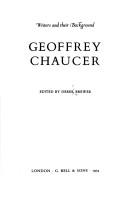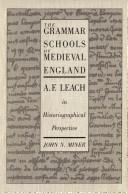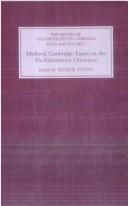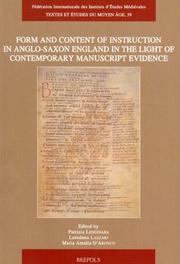| Listing 1 - 10 of 12 | << page >> |
Sort by
|

ISBN: 0300111029 9780300111026 Year: 2006 Publisher: New Haven Yale university press
Abstract | Keywords | Export | Availability | Bookmark
 Loading...
Loading...Choose an application
- Reference Manager
- EndNote
- RefWorks (Direct export to RefWorks)
Children have gone to school in England since Roman times. By the end of the middle ages there were hundreds of schools, supporting a highly literate society. This book traces their history from the Romans to the Renaissance, showing how they developed, what they taught, how they were run, and who attended them. Every kind of school is covered, from reading schools in churches and town grammar schools to schools in monasteries and nunneries, business schools, and theological schools. The author also shows how they fitted into a constantly changing world, ending with the impacts of the Renaissance and the Reformation. Medieval schools anticipated nearly all the ideas, practices, and institutions of schooling today. Their remarkable successes in linguistic and literary work, organizational development, teaching large numbers of people shaped the societies that they served. Only by understanding what schools achieved can we fathom the nature of the middle ages.
Schools --- Education, Medieval --- Ecoles --- Education médiévale --- History --- Histoire --- Education médiévale --- Public institutions --- Education --- Public schools --- England --- 16th century --- Education [Medieval ] --- Schools - England - History - 16th century --- Education, Medieval - England
Book
ISBN: 0691055009 9780691055008 Year: 1987 Publisher: Princeton (N.J.): Princeton university press
Abstract | Keywords | Export | Availability | Bookmark
 Loading...
Loading...Choose an application
- Reference Manager
- EndNote
- RefWorks (Direct export to RefWorks)
Education --- Education, Medieval --- History --- England --- Intellectual life --- -Education, Medieval --- -Education --- Medieval education --- Seven liberal arts --- Civilization, Medieval --- Learning and scholarship --- Children --- Education, Primitive --- Education of children --- Human resource development --- Instruction --- Pedagogy --- Schooling --- Students --- Youth --- Civilization --- Mental discipline --- Schools --- Teaching --- Training --- Historische en vergelijkende pedagogiek --- History. --- -History --- Historische en vergelijkende pedagogiek. --- Education - England - History --- Education, Medieval - England --- England - Intellectual life - 1066-1485
Book
ISBN: 085991299X 9780859912990 Year: 1991 Publisher: Woodbridge Boydell and Brewer
Abstract | Keywords | Export | Availability | Bookmark
 Loading...
Loading...Choose an application
- Reference Manager
- EndNote
- RefWorks (Direct export to RefWorks)
Latin philology --- Education, Medieval --- Study and teaching --- History --- -Latin language --- -Classical languages --- Italic languages and dialects --- Classical philology --- Education --- Medieval education --- Seven liberal arts --- Civilization, Medieval --- Learning and scholarship --- -History --- England --- Intellectual life --- -Education, Medieval --- -Study and teaching --- -England --- -Latin philology --- Latin language --- Latin literature --- Latin philology - Study and teaching - England - History - To 1500. --- Education, Medieval - England.

ISBN: 0713517913 9780713517910 Year: 1974 Publisher: London : Bell,
Abstract | Keywords | Export | Availability | Bookmark
 Loading...
Loading...Choose an application
- Reference Manager
- EndNote
- RefWorks (Direct export to RefWorks)
Education, Medieval --- Chaucer, Geoffrey --- Knowledge and learning --- -Education --- Medieval education --- Seven liberal arts --- Civilization, Medieval --- Learning and scholarship --- History --- -Knowledge and learning --- Chaucer, Geoffrey, --- Knowledge and learning. --- -Chaucer, Geoffrey --- Chaucer, Jeffrey, --- Chʻiao-sou, Chieh-fu-lei, --- Chieh-fu-lei Chʻiao-sou, --- Choser, Dzheffri, --- Choser, Zheoffreĭ, --- Cosvr, Jvoffrvi, --- Tishūsar, Zhiyūfrī, --- Education, Medieval - England --- Chaucer, Geoffrey - Knowledge and learning --- Chaucer (geoffrey), d. 1400

ISBN: 0773561528 9780773561526 0773506349 9780773506343 Year: 1990 Publisher: Kingston, Ont. McGill-Queen's University Press
Abstract | Keywords | Export | Availability | Bookmark
 Loading...
Loading...Choose an application
- Reference Manager
- EndNote
- RefWorks (Direct export to RefWorks)
Leach struggled to rid his countrymen of the persistent myth that the monks had been the schoolmasters of the pre-Reformation period in England. To accomplish his goal he embarked on a program of research and publication, based on a mass of hitherto unexplored documents, to establish the great antiquity of many of the nation's Latin schools and to show that they derived from clerical, but secular, colleges of Anglo-Saxon times. Showing this would, he hoped, eliminate the persistant belief that monks had been the school-masters of pre-Reformation England. Miner argues that previous readings of Leach, which suggest that his main concern is to take issue with the Reformation and argue that this great watershed in history was - at least with regard to education - a retrograde step rather than a great movement forward, have not taken into account the full range of his publications. The aim of the present study is thus to place both Leach's achievements and his more controversial theses in historical context. A separate chapter devoted to unpublished material from the Charity Commission reveals Leach's method of work and provides an analytic survey of opinions on his work by reviewers and historians. The author supplements Leach's lack of material on the school curriculum through descriptive analysis of grammatical manuscripts from the fourteenth and fifteenth centuries, showing the presence of an educational Christendom of which Leach was clearly unaware.
Education, Medieval --- Endowed public schools (Great Britain) --- Endowed schools (Great Britain) --- Public schools (Great Britain) --- Public schools, Endowed (Great Britain) --- Private schools --- Education --- Medieval education --- Seven liberal arts --- Civilization, Medieval --- Learning and scholarship --- Historiography. --- History --- Leach, Arthur Francis, --- Leach, A. F. --- Education, Medieval - England - Historiography. --- Endowed public schools (Great Britain) - Historiography.
Book
ISBN: 1852850035 9781852850036 Year: 1989 Publisher: London Hambledon
Abstract | Keywords | Export | Availability | Bookmark
 Loading...
Loading...Choose an application
- Reference Manager
- EndNote
- RefWorks (Direct export to RefWorks)
Education, Medieval --- Renaissance --- Education --- History --- England --- Social conditions --- -Education, Medieval --- -Renaissance --- Revival of letters --- Civilization --- History, Modern --- Civilization, Medieval --- Civilization, Modern --- Humanism --- Middle Ages --- Medieval education --- Seven liberal arts --- Learning and scholarship --- Children --- Education, Primitive --- Education of children --- Human resource development --- Instruction --- Pedagogy --- Schooling --- Students --- Youth --- Mental discipline --- Schools --- Teaching --- Training --- -History --- -Social conditions --- -Education --- -England --- Education, Medieval - England --- Renaissance - England --- Education - England - History - 16th century --- England - Social conditions - 1066-1485 --- England - Social conditions - 16th century
Book
ISBN: 9780888441881 0888441886 9781771103558 1771103558 Year: 2014 Volume: 188 Publisher: Toronto : Pontifical Institute of Mediaeval Studies
Abstract | Keywords | Export | Availability | Bookmark
 Loading...
Loading...Choose an application
- Reference Manager
- EndNote
- RefWorks (Direct export to RefWorks)
"The need for an educated parochial clergy had been seen from early times and during the Middle Ages was articulated by popes, councils and generations of canonists. Uneducated parish priests, it was frequently said, were like the blind leading the blind, both in peril of falling into the pit. Various efforts were made to remedy this problem, culminating in 1298 with the decretal of Pope Boniface VIII Cum ex eo, which allowed non-priest rectors of parish churches to absent themselves for up to seven years to attend university. When their studies were completed, they had to become priests within one year. This study set out to examine how this decretal was implemented over the next fifty years in the diocese of Lincoln, the largest in England. The bishops' registers, however, revealed a much wider practice. In addition to dispensations granted by virtue of Cum ex eo, a substantial number of licences to study were also granted to rectors who were already priests, particularly after 1320. In total, over twelve hundred rectors of Lincoln diocese received permissions to study during this half-century period. A comparison with two other dioceses shows that the granting of such permissions was not peculiar to Lincoln diocese and occurred elsewhere at similar rates. This is suggestive of a wider English phenomenon."-- Publisher description.
Education, Higher --- Education, Medieval --- History --- Catholic Church --- 266.2*24 --- 27 <420> "04/14" --- Education --- Medieval education --- Seven liberal arts --- Civilization, Medieval --- Learning and scholarship --- College students --- Higher education --- Postsecondary education --- Universities and colleges --- Vorming van lokale clerus --- Kerkgeschiedenis--Engeland--Middeleeuwen --- Catholic Church. --- Lincoln (England : Diocese : Catholic Church) --- 266.2*24 Vorming van lokale clerus --- Education, Higher - England - Lincoln Region - History - Middle Ages, 600-1500 - Sources --- Education, Medieval - England - Lincoln Region - Sources
Book
ISBN: 0691054304 9780691054308 Year: 1985 Publisher: Princeton (N.J.) : Princeton university press,
Abstract | Keywords | Export | Availability | Bookmark
 Loading...
Loading...Choose an application
- Reference Manager
- EndNote
- RefWorks (Direct export to RefWorks)
Education, Medieval --- English language --- Learning and scholarship --- Education, Elementary --- Literacy --- Histoire de l'enseignement --- --York --- --1340-1548 --- --Angleterre --- --Study and teaching --- History --- Grammar --- Study and teaching --- Aids and devices --- Church of England. Diocese of York --- Yorkshire --- Onderwijs. --- Education, 1340-1548 --- Church of England. --- History. --- Education, 1340-1548. --- Education, Medieval - England - Yorkshire --- English language - Study and teaching - England - Yorkshire - History --- English language - Grammar - Study and teaching - Aids and devices --- Learning and scholarship - History - Medieval, 500-1500 --- Education, Elementary - England - Yorkshire - History --- Literacy - England - Yorkshire - History --- York --- Angleterre

ISBN: 0851153445 Year: 1993 Volume: 2 Publisher: Woodbridge Boydell
Abstract | Keywords | Export | Availability | Bookmark
 Loading...
Loading...Choose an application
- Reference Manager
- EndNote
- RefWorks (Direct export to RefWorks)
378.4 <41 CAMBRIDGE> --- Education, Medieval --- -Education --- Medieval education --- Seven liberal arts --- Civilization, Medieval --- Learning and scholarship --- Universiteiten--Verenigd Koninkrijk van Groot-Brittannië en Noord-Ierland--CAMBRIDGE --- History --- University of Cambridge --- -Cambridge. --- Academia Cantabrigiensis --- Cambridge University --- Ying-kuo Chien-chʻiao ta hsüeh --- Chien-chʻiao ta hsüeh --- 剑桥大学 --- Jianqiao da xue --- Kembridzhiĭn Ikh Surguulʹ --- Кембриджийн Их Сургууль --- Kambrija Yeke Surġaġuli --- Universität Cambridge --- -Universiteiten--Verenigd Koninkrijk van Groot-Brittannië en Noord-Ierland--CAMBRIDGE --- -History --- 378.4 <41 CAMBRIDGE> Universiteiten--Verenigd Koninkrijk van Groot-Brittannië en Noord-Ierland--CAMBRIDGE --- Cambridge. --- History. --- Education [Medieval ] --- England --- Education, Medieval - England. --- Кембриджийн Их Сургууль --- Chancellor, Masters, and Scholars of the University of Cambridge --- Cambridge. University

ISBN: 9782503525914 2503525911 9782503539232 Year: 2007 Volume: 39 Publisher: Turnhout Brepols
Abstract | Keywords | Export | Availability | Bookmark
 Loading...
Loading...Choose an application
- Reference Manager
- EndNote
- RefWorks (Direct export to RefWorks)
The essays collected in this volume focus on a prominent aspect of Anglo-Saxon culture: educational texts and the Insular manuscripts which have preserved them.The English imported manuscripts and texts from the Continent, whilst a series of foreign masters, from Theodore of Tarsus to Abbo of Fleury, brought with them knowledge of works which were being studied in Continental schools. Although monastic education played a leading role for the entire Anglo-Saxon period, it was in the second half of the tenth and early eleventh centuries that it reached its zenith, with its renewed importance and the presence of energetic masters such as Æthelwold and Ælfric. The indebtedness to Continental programs of study is evident at each step, beginning with the Disticha Catonis. Nevertheless, a number of texts initially designed for a Latin-speaking milieu appear to have been abandoned (for instance in the field of grammar) in favour of new teaching tools.Beside texts which were part of the standard curriculum, Anglo-Saxon manuscripts provide abundant evidence of other learning and teaching instruments, in particular those for a specialized class of laymen, the Old English læce, the healer or physician. Medicine occupies a relevant place in the book production of late Anglo-Saxon England and, in this field too, knowledge from very far afield was preserved and reshaped.All these essays, many by leading scholars in the various fields, explore these issues by analysing the actual manuscripts, their layout and contents. They show how miscellaneous collections of treatises in medieval codices had an internal logic, and highlight how crucial manuscripts are to the study of medieval culture.
Education, Medieval --- Manuscripts, Medieval --- Education médiévale --- Manuscrits médiévaux --- History --- Sources --- Histoire --- 091 <41> --- 091 =20 --- 37 <41> --- 091:371 --- Handschriftenkunde. Handschriftencatalogi--Verenigd Koninkrijk van Groot-Brittannië en Noord-Ierland --- Handschriftenkunde. Handschriftencatalogi--Engels --- Opvoeding en onderwijs --(algemeen)--Verenigd Koninkrijk van Groot-Brittannië en Noord-Ierland --- Handschriftenkunde. Handschriftencatalogi-:-Onderwijs. Schoolwezen --- Conferences - Meetings --- 091:371 Handschriftenkunde. Handschriftencatalogi-:-Onderwijs. Schoolwezen --- 37 <41> Opvoeding en onderwijs --(algemeen)--Verenigd Koninkrijk van Groot-Brittannië en Noord-Ierland --- 091 =20 Handschriftenkunde. Handschriftencatalogi--Engels --- 091 <41> Handschriftenkunde. Handschriftencatalogi--Verenigd Koninkrijk van Groot-Brittannië en Noord-Ierland --- Education médiévale --- Manuscrits médiévaux --- Medieval manuscripts --- Manuscripts --- Education --- Medieval education --- Seven liberal arts --- Civilization, Medieval --- Learning and scholarship --- Education [Medieval ] --- Congresses --- England --- Anglo-Saxons --- Manuscripts [Latin ] --- Sources. --- Education, Medieval - England - History - Sources - Congresses --- Manuscripts, Medieval - England - Congresses --- History, Ancient --- Ancient history --- Ancient world history --- World history
| Listing 1 - 10 of 12 | << page >> |
Sort by
|

 Search
Search Feedback
Feedback About UniCat
About UniCat  Help
Help News
News